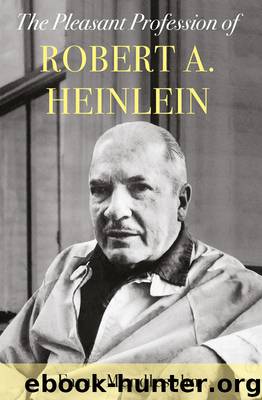The Pleasant Profession of Robert A. Heinlein by Mendlesohn Farah;

Author:Mendlesohn, Farah; [Mendlesohn, Farah]
Language: eng
Format: epub
ISBN: 9781783526802
Publisher: Unbound
Published: 2018-12-15T00:00:00+00:00
Guns: An Aside
One aspect of Heinlein’s beliefs about civic society was that the citizen had a right to carry arms and that this was a fundamental element of individual responsibility. Rafeeq McGiveron notes succinctly, ‘Heinlein rarely says that might makes right; he is correct, however, in reminding us that might may be necessary to preserve right’ (‘He just plain liked guns’, p. 67).
However, although Heinlein was a ferocious supporter of the Second Amendment, regarding licensing as a ‘violation of civil liberty’ (letter to Alice Dalgliesh, 19 April 1949; Grumbles from the Grave), it is very hard indeed to find evidence that he considered guns to be an effective weapon of defence. In novel after novel guns fail to be useful: individuals are overpowered when they attempt to defend themselves; attackers (even government attackers) are overwhelmed by the angry and determined unarmed (a position possible to hold in the days before mass shooters went in with AR-15s). They aren’t even terribly useful in single-person attacks: more than one attacker is disarmed.
One clue to this might be in the letter to Alice Dalgliesh in 1949 mentioned above and so often cited. First, the letter was written in 1949. We still need later evidence as to his opinions. Second, he writes ‘I am not inexperienced with guns. I have coached rifle and pistol teams and conducted the firing of millions of rounds from pistols to turrets. I am aware of the dangers of guns, but I do not agree that those dangers can be eliminated or even ameliorated by coercive legislation.’ We tend to focus on the support for guns in this statement. What is rarely noticed is its revelation: Heinlein never fired a shot in combat or was ever shot at in combat. Heinlein’s primary use of armaments would have been the large guns of a ship. His use of firearms was carefully controlled. In this section I intend to argue that Heinlein’s work reflects this, from his use of the code duello, through his restriction of where guns are appropriate, and on to his tendency to undermine, in his narrative trajectories, any rhetoric or argument about guns as a weapon of defence.
One of the most oft-quoted lines from Heinlein is this one: ‘an armed society is a polite society.’ It continues, ‘Manners are good when one may have to back up his acts with his life …’ Very few people, if any, however take a look at the context of this quotation. Most people do not even notice that the quotation comes near the end of Beyond This Horizon (Chapter 15 of 18), a novel that is all about on what basis supremacy and hierarchy in a society should be organised, and what should happen to those at the bottom of, or outside, the hierarchy. The paragraph from which the quotation is taken continues: ‘gun-fighting has a strong biological use. We do not have enough things to kill off the weak and the stupid these days. But to stay alive as
Download
This site does not store any files on its server. We only index and link to content provided by other sites. Please contact the content providers to delete copyright contents if any and email us, we'll remove relevant links or contents immediately.
4 3 2 1: A Novel by Paul Auster(11788)
The handmaid's tale by Margaret Atwood(7447)
Giovanni's Room by James Baldwin(6808)
Asking the Right Questions: A Guide to Critical Thinking by M. Neil Browne & Stuart M. Keeley(5355)
Big Magic: Creative Living Beyond Fear by Elizabeth Gilbert(5351)
Ego Is the Enemy by Ryan Holiday(4956)
On Writing A Memoir of the Craft by Stephen King(4662)
The Body: A Guide for Occupants by Bill Bryson(4580)
Ken Follett - World without end by Ken Follett(4443)
Bluets by Maggie Nelson(4260)
Adulting by Kelly Williams Brown(4232)
Eat That Frog! by Brian Tracy(4149)
Guilty Pleasures by Laurell K Hamilton(4116)
White Noise - A Novel by Don DeLillo(3829)
The Poetry of Pablo Neruda by Pablo Neruda(3813)
Fingerprints of the Gods by Graham Hancock(3733)
Alive: The Story of the Andes Survivors by Piers Paul Read(3729)
The Book of Joy by Dalai Lama(3695)
The Bookshop by Penelope Fitzgerald(3619)
